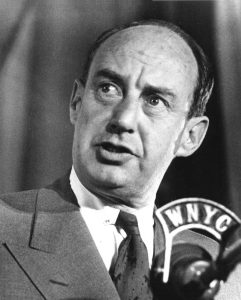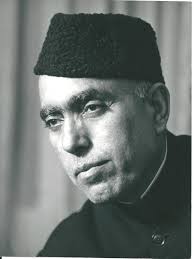Peace Watch » Editor's Take, Featured » Was USA Really Interested in Independent Kashmir Or Communist Propaganda
Was USA Really Interested in Independent Kashmir Or Communist Propaganda
Punchline
Red Herring and Truth
By
Z. G. Muhammad
Like Banquo’s ghost in Shakespeare’s play Macbeth, Adlai Stevenson revisits Kashmir’s political narrative at regular intervals. For more than eleven years his ghost persistently hovered over the political horizons of Srinagar, Jammu, and Delhi- inside the court rooms, in the Parliament and public places. It has once again reappeared after a report prepared by the Central Intelligence Agency (CIA) years ago has been declassified and published in a section of the press. ‘The report rules out Washington having conspired and supported Sheikh Mohammad Abdullah’s plans for an independent Kashmir in 1953.’ The declassified report may not be that much of consequences to the contemporary political situation in Kashmir yet for understanding the international implications of the Kashmir Dispute it holds academic interest. Moreover, the resolution of the Dispute continues to be key to peace in the South-Asia.
In the first week of May 1953, American Democratic leader, Adlai Stevenson had two luncheon meetings with Sheikh Muhammad Abdullah then Prime Minister of Jammu and Kashmir. The Government of India perhaps saw this meeting as a continuation of Sheikh Abdullah’s meeting with US Ambassador Loy Henderson during his secret visit to Srinagar in September 1950. About his meeting with Sheikh Abdullah the US Ambassador had reported to his country: ‘Sheikh Abdullah talking about future of Kashmir was vigorous in restating his opinion that it should be independent; that overwhelming majority population desired this independence, and he had reason to believe that some Azad Kashmir ministers also desired independence.’ In 1978, when this report was published in Indian newspapers it had stirred hornet’s nest in political circles in New Delhi. ‘It was seen as an evidence of Sheikh Abdullah’s treason and America’s meddling in the affairs of India. Fingers were also raised again the Indira-Sheikh Agreement that had brought Abdullah once again to power. In October 1978, I interviewed estranged lieutenant of Sheikh Abdullah former Deputy Chief Minister Mirza Afzal Beg about declassified Henderson papers and Adlai Stevenson meeting. In his typical style, he corroborated the reports and added meeting of Nelson Rockefeller to the list. (The interview was published 15 Oct 1978 issue of Onlooker). In May 1984, I interviewed former Prime Minister of India Morarji Desai about 9 August 1953 happenings in Kashmir and  how justified was Sheikh Abdullah’s dismissal. He replied, ‘Nehru had shown papers about this to him.’
how justified was Sheikh Abdullah’s dismissal. He replied, ‘Nehru had shown papers about this to him.’
The Adlai Stevenson 1953 visit once again surfaced on the political sky of the state in 2002, when the CIA declassified its 26 March 1953 report on Kashmir. The moot point was if Stevenson’s visit to India and Kashmir in May 1953 had anything to do with this report that spoke of New Delhi’s stubborn attitude toward the resolution of Kashmir. It had said, “To date, all negotiations have broken down, Pakistan has consistently displayed amenability to the suggestions of mediators. India, however, has adamantly insisted that Pakistan has no legal rights in Kashmir, and the Indian Government will not agree to any troop ratio not overwhelmingly in its favour.”
Looking at the US policy at that point of time that has been dealt in detail by Howard Schaffer in his book the ‘Limits of Influence, Americas Role in Kashmir’ chapter two “Impact of alliance with Pakistan” the inclusion of Kashmir in the itinerary of Stevenson ostensibly by then Secretary of State J.F. Dulles could not have been for the heck of it.
The two luncheons meeting of Kashmir Prime Minister with Stevenson cost Abdullah not only his office, eleven years incarcerations but also entangled him in a marathon trial that has gone into the history of our land as the Kashmir conspiracy case. The CIA report of 11 August 1953, declassified under OCI No. 8441 and recently published in a section of the press has demystified the whole story. ‘Denying the American government meddling in Kashmir and the Adlai Stevenson supporting the idea of independence for Kashmir’, the secret document candidly says that instability in Kashmir had started one year before the visit of the Stevenson. In July 1953, it had apparently come to head prompting New Delhi to plot for installing a puppet government in the state with a pledge for arranging complete accession of Kashmir to India.’ Nehru, in the changed Kashmir scenario, was now strongly feeling that in Kashmir he was on a slippery ground. The assurances given by Indra Gandhi in 1948 in a letter to him from Srinagar that with Sheikh Abdullah on India’s side Kashmiris would vote for India had evaporated. He had realised that in case a plebiscite was held in Kashmir the overwhelming Muslim majority will not vote for him. This is also corroborated by the declassified document of the CIA of 26 March 1953. The document stating India position on Kashmir was based on Jawaharlal “emotionalism” and he feared “that the Moslem majority in Kashmir would vote for accession to Pakistan in a free plebiscite. Unless Pakistan surrenders to India’s demands, the Security Council probably cannot effect a settlement.”
From the various declassified document about 1953 situation in Kashmir apparently, it seems India removing Sheikh Abdullah had more to do with Nehru’s nervousness rather than Abdullah per se thinking of drifting away the whole hog from India. Nonetheless, that does not suggest that the United State did not toy with the idea of Independent Kashmir and did not see a role for Sheikh Abdullah in it. The idea of the third option was brought to the notice of Mr Austin- US envoy first time by Sheikh Abdullah after debates on UN in Kashmir. Had US no interest in third option the State Department ‘two months later would not have sent a message to Karachi and New Delhi saying that if Independence appeared to be basis for India-Pakistan settlement on Kashmir, the United States would probably not oppose the idea, although it would not take the initiative in promoting it.’
Published in Greater Kashmir on 13-02-2017
.
Filed under: Editor's Take, Featured · Tags: Adlai Stevenson, Amercian Conspiracy in Kashmir, Kashmir Conspiracy Case, Nehru, Sheikh Abdullah, Z. G. muhammad







